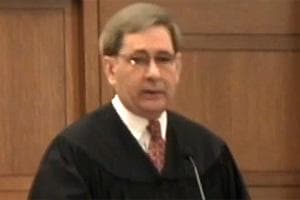Advertisement
Appeals Court To Consider Bulger Request To Remove Judge
ResumeOn Tuesday, a federal appeals court will consider a request from the lawyer representing accused Boston mobster James "Whitey" Bulger that the federal judge in Bulger's multiple murder case be removed.
Twice before, Bulger's attorney, J.W. Carney, has asked Judge Richard Stearns to remove himself from the case. And twice Stearns has refused, insisting he can be fair and impartial.
Now, Bulger's defense has been granted an appeal to a higher court.

The principle at issue here is an old one:
"It is a very fearful thing," wrote an English jurist eight centuries ago, "to litigate under a suspect justice and very often results in the saddest outcomes...
Let the suspect judge be removed."
"Suspicions and doubts about the impartiality of judges, suspicions and doubts about the administration of justice, that's what we're talking about," said Hofstra University's Monroe Freedman, an expert on judicial ethics.
One ground for recusal is the proof of bias and partiality, which Stearns emphatically denies.
Another ground is the appearance of bias. And Freedman says appearance is as important as the reality of bias. He cites the U.S. Supreme Court.
"We're talking about the public's view of the integrity of the administration of justice," Freedman said.
Former federal prosecutor Brad Bailey says that concern for appearance and perception is why the appeals court has acted so quickly to hear Bulger's case for recusal.
"This is a case that continues to be about public perception, public integrity and public trust," Bailey said. "And I think for that reason extra special care is being given to try to finally wash out the stain."
"The stain" refers to the scandalous history of the use and protection of Bulger as a secret informant by the FBI and the Department of Justice — a history uncovered, indeed dug up, by another federal judge, Mark Wolf, and laid out in a nearly-700-page report.
So, said attorney Harvey Silverglate, "We already start out with a suspicion that this is the same case, and we have to be particularly cautious in this case to not only do justice but to appear to do justice. And it's a bit of an uphill climb because of the already-demonstrated history of corruption in the whole Bulger investigation and prosecution."
Bulger's attorney argues that the judge has a conflict of interest. In the 1980s, Stearns was chief of the criminal division of the U.S. Attorney's Office here, when Bulger was at the peak of his power.
During those years, Stearns developed a very close friendship to fellow prosecutor Robert Mueller, as WBUR has reported earlier. Now Mueller is the head of the FBI, another possible conflict of interest, claims the defense.
But Stearns has pointed out he wasn't involved with the special unit that prosecuted organized crime. Moreover, he insists he never "participated in or [had] any knowledge of any case or investigation" involving Bulger.
"There's also a presumption that judges who know of a reason to recuse themselves will step forward when the case merits it, and the fact that he's not stepping forward means that in his opinion it's not merited in this case," Bailey said.
"Recusal should be very rarely invoked," said attorney Chester Darling, who won his bid to have the U.S. Court of Appeals remove a federal judge from a case in 2001. It rarely happens.
"They are deferential to their colleagues and I think they are very sensitive about people questioning their ability to be objective," Darling said.
But Silverglate, who believes Stearns should step down, says when it comes to Bulger, this is no normal appeal.
"I think the Court of Appeals recognizes that there are grounds here for reasonable people to question whether Judge Stearns should really be the judge to hear this trial," he said.
Stearns himself has opted not to appear or argue Tuesday, saying he has nothing to add to his decisions not to step down.
But federal prosecutors argue that the defense motion for recusal is baseless, comes without any proof, and further delays the trial and the interests of justice.
By the way, the indictment charging Bulger with 19 murders dates back to 1999. And the judge first assigned to this case, Edward Harrington, invited all parties to seek his recusal, then, when asked, did recuse himself, saying that in his career as a former U.S. attorney, he had prosecuted organized crime.
This program aired on January 8, 2013.
